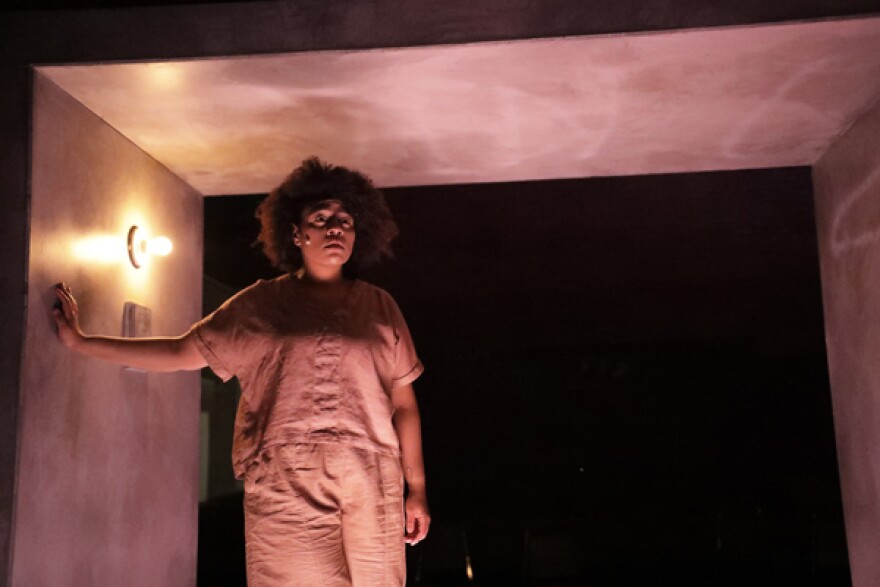“A Deed Without a Name” is a Rubik’s cube of theater. The play which is being given its world premiere by Troy Foundry Theatre is an intense philosophical exercise that ponders the meaning of existence.
However, there are so many theatrical and literary influences in it that the play feels like a puzzle you have to put together.
Playwright Katy Pedro is a writer of great passion who creates three characters trapped in large, separate cubes in which they can hear and speak to one another, but not able to see anyone. Their conversations, which are really disjointed bursts of thought, deal with memories of their lives.
Initially, the randomness of their thought process and the helplessness of their position immediately recalls the work of the Existential playwrights of the 1940s and 50s.
The women are similar in spirit to the two tramps in Samuel Beckett’s “Waiting for Godot, ” a play that ponders the meaninglessness of existence. Too, the trapped characters evoke the mood of Sartre’s “No Exit,” a work that implies life is filled with dread, confusion and disorientation. As the actors speak about the frustrations of conformity, sexual identity and social oppression, their words captures the rhythms and cadences, as well as the themes found in Alan Ginsberg’s mid-1950s epic poem “Howl.”
When you wonder if the women are three individuals or split versions of one whole, you can’t escape comparing the concept to Edward Albee’s play, “Three Tall Women.”
I point out these influences for two reasons. One is that the play is intellectually obtuse to the point of being incoherent to almost anyone without an advanced degree in either literature or philosophy. And, probably to them as well.
Even more important, without trying to deny the legitimacy of a play exploring the theme of self-identity, there is an odd feeling that the material is at least 50 years past its prime about raising questions about which there are no answers. It’s redundant and self-serving. At some point, even theologians gave up debating how many angels could dance on the head of a pin.
Performed in an open alley in downtown Troy, the hauntingly lit set adds to the surreal mood of the piece. It is an ideal complement to goals of the company who want to make an abstract exercise interesting - both intellectually and visually.
Pedro’s language does capture the evocative yearning of the characters called A, C and Toms. Though often as trivial as they are profound, there are moments when hearing the words spoken almost compensates for the lack of emotional connection we have to the three desperate souls on stage. Almost.
Even if the audience finds it difficult to connect and relate to the characters, it is clear the actors totally believe in what the rest of us have to intuit. We might not know who A, C and Toms are, or why they are in pain, but Morgan Haywood, Angelique Powell and Eliana Anneliscia Rowe signal a total and complete connection to these ephemeral creations.
The play is guided not by a director but by six curators. The three actors are three of those curators, which might explain their often-gratuitous movement within the cell-like cubes.
“A Deed Without A Name” is academic theater that lacks clarity. Both playwright Pedro and Troy Foundry have the talent and the courage to produce work which asks you to think rather than just observe.
But, asking questions that have no answers is akin to writing a mystery with no conclusion. It leaves you frustrated and feeling empty.
“A Deed Without a Name” plays at 8:30 p.m. through Sunday in the alley next to the Trojan Hotel, 41-43 3rd Street, downtown Troy. For tickets and information go to infor@troyfoundrythreatre.com
Bob Goepfert is theater reviewer for the Troy Record.
The views expressed by commentators are solely those of the authors. They do not necessarily reflect the views of this station or its management.






